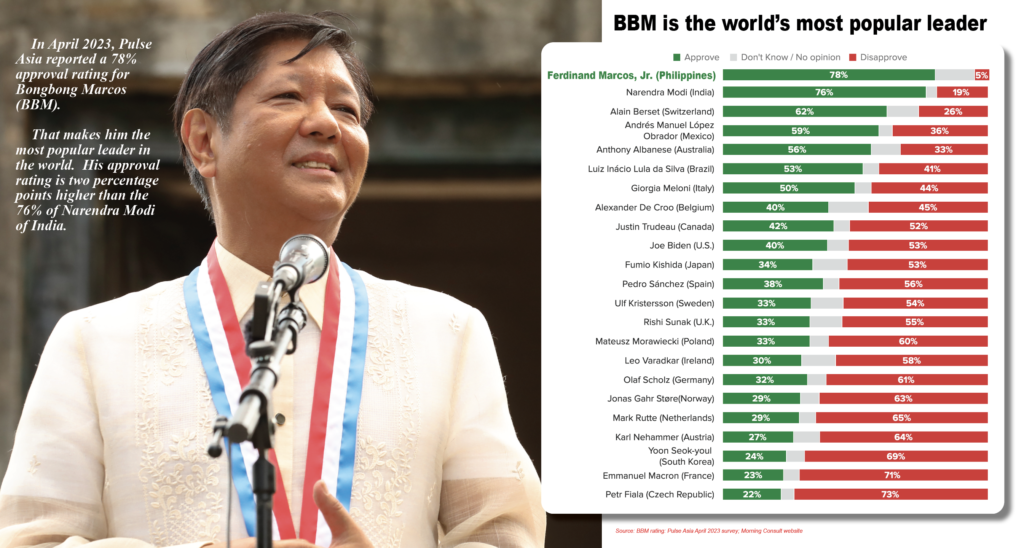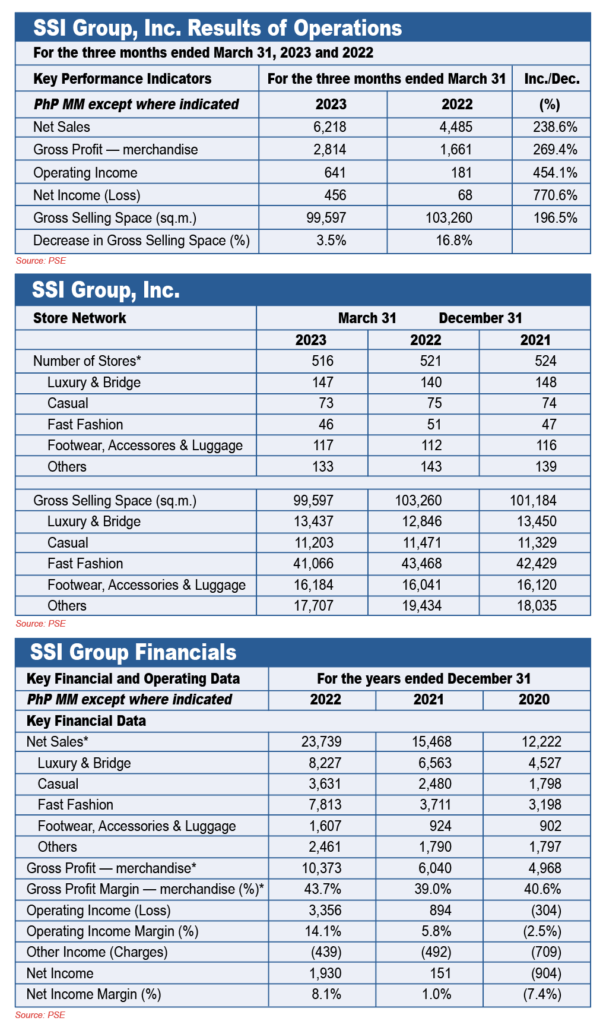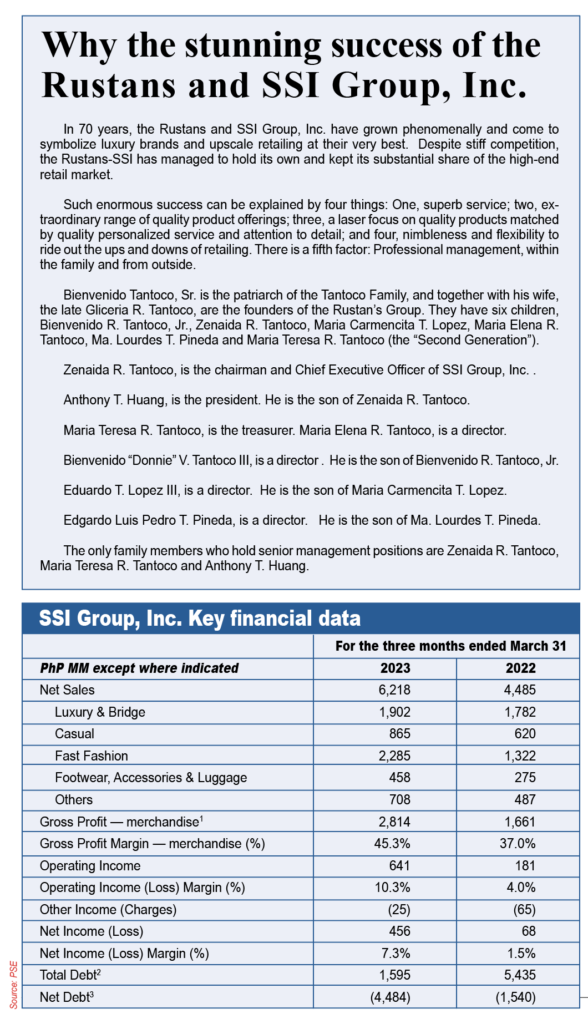By Tony Lopez
So much distrust. Every step of the way.
That is the sad drama that accompanied the creation of the Maharlika Investment Fund. We cannot trust our government to do one of its most basic functions—pool tax and other money, invest it in assets that will do good for the people, and earn some sums to boost state coffers.
Every one of the 24 million households in the Philippines does that every day – combine savings, borrowings and extra income to buy or build up an asset.
That asset may include an electric fan, toaster, a coffee maker, an oven, an aircon, a washing machine, an iPhone, a bike, a computer, a printer, or even a car or a house. Or a dog. It’s called capital expenditure (capex). The pet, appliance or equipment bought with the money is expected to make one’s life easier, more comfortable, or a bit more luxury-looking because one has worked so hard one deserves something better.
In the case of the government, it wants to systematize the exercise thru a mechanism called a sovereign investment fund. Later on, the word “sovereign” was dropped, as if it were a bad word.
Look, even the Seminole Indians of Florida USA have a “sovereign” wealth fund and they number just 3,000. Yet, the tribe is reckoned as sovereign. Their money has been used to operate coffee shops, casinos, and gaming resorts.
So why not allow the government of a nation of 112 million Filipinos to form a sovereign wealth fund? After all, this is a government that is one of the oldest in Asia, at 125 years old this month.
Our government has seen two World Wars, two revolutions (1896 and 1986), and no less than 13 coup attempts—one under Ferdinand Marcos Sr., nine under Corazon Aquino, one under Joseph Estrada, and two under Gloria Macapagal Arroyo.
The Philippine government is fighting the world’s longest communist insurgency (54 years) and the world’s longest separatist movement (51 years). The Philippine military thus is among the most experienced armies in the world, in fighting both foreign and domestic enemies. So far, we are still one whole nation. This means we are stable.
From the revolutions, world wars, and coups, the Philippines emerged a strong and resilient nation, one which every global power, from China, to the US, to Europe and even Russia, wants to do business with.
Also, the Ferdinand “Bongbong” Marcos Jr. administration is not an incompetent government. The Philippine economy is among the region’s and the world’s best performers. In 2022. GDP growth of 7.6% was the highest in 46 years. In first quarter 2023, GDP growth of 6.4% was the best in ASEAN.
In April 2023, Pulse Asia reported a 78% approval rating for Bongbong Marcos (BBM).

That makes him the most popular leader in the world. His approval rating is two percentage points higher than the 76% of Narendra Modi of India, and certainly miles above the 62% of Alain Berset (Switzerland), 59% of Andres Manuel Lopez Obrador (Mexico), 56% of Anthony Albanese (Australia), 53% of Lula (Brazil), 50% of Giorgia Meloni (Italy), and 42% of Justin Trudeau (Canada).
Businessmen and cynical politicians cannot seem to trust the future managers of the Maharlika Investment Fund. Their greatest fear is corruption, that the money of the fund would be stolen, dissipated or simply disappear into nothingness.
Filipinos are among the world’s best bankers and investment fund managers. In its heyday, Citibank in the Philippines was among the best and most profitable foreign bank branches in the world.
Even today, the Philippine Citibank N.A., the largest foreign bank here, routinely yields mind-boggling returns on equity—78.59% in 2022 and 88.49% in 2021, local banking’s best and highest, amid two of the worst years for banking. Returns of 78.59 and 88.49 are like increasing your money 1.67 times in just two years. And Citibank is managed and manned by Filipinos.
After Citibank, the most profitable bank is BDO Private Bank, Inc.. Its ROE is 20.04% in 2022 and 20.75 in 2021, meaning it doubles money every five years.
Effective August 1, 2022, Union Bank of the Philippines has completed its acquisition of Citi Philippines’ consumer business—local credit card, unsecured lending, deposit and investment businesses, as well as Citicorp Financial Services and Insurance Brokerage Philippines Inc. (CFSI), which provides insurance and investment products and services to retail customers. Owned by the Aboitizes and headed by President Edwin Bautista, UnionBank is among the Philippines’ best and most profitable banks. UB profits rose 30% in the first quarter to P3.4 billion.

It aims to be the largest and most profitable retail bank in two years.
What do Citibank, BDO and UnionBank have in common which explains why they are so profitable? They manage wealth, the money of rich people and large corporations.
That means there is money in managing money.
So when the government wants to manage its own money and the people’s money by putting up an investment fund, why not allow it to do so?
The Philippines is one of the largest countries in the world. With a 112-million population, it is the 12th largest consumer market on earth.
As an archipelago of 7,600 islands, it is the second largest in the world. Its coastline is twice that of the US. Its land area is 300,000 square kms (30 million hectares).
It has 2.236 million sq kms of Exclusive Economic Zone .
With nominal GDP of $441 billion and GDP PPP of $1.29 trillion, the Philippines ranks among the 30 largest economies, out of 190 countries.

